Salt is mentioned over 30 times in the Bible, and has played a significant role in ancient cultures as a symbol of hospitality, purification, and wisdom.
But beyond its biblical significance, salt also plays a crucial role in our physical health. We need salt to maintain proper fluid balance, nerve function, and muscle function. However, consuming too much salt can lead to health problems such as hypertension and cardiovascular disease.
In this blog, we’ll explore the importance of salt in the Bible and how it relates to our health. We’ll also discuss the role of salt in common health conditions and provide practical tips for incorporating salt into a healthy diet. By the end, you’ll have a better understanding of the significance of salt and how to consume it in moderation for optimal health.
What is Salt?
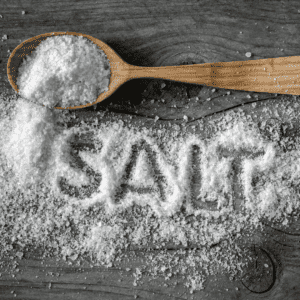
Salt is a mineral that’s commonly used as a seasoning for food. It’s made up of two elements, sodium and chloride, which are essential for human health. Sodium plays a critical role in regulating the fluid balance in your body, while chloride is important for maintaining proper pH levels.
You can find salt in different forms such as table salt, sea salt, and Himalayan pink salt. Table salt is the most common type, and it’s typically iodized, which means that it has added iodine, an essential nutrient that supports thyroid function. Sea salt is harvested from evaporated seawater and is considered a healthier alternative to table salt because it contains trace minerals that provide additional health benefits. Himalayan pink salt is a type of rock salt that comes from the Himalayan region and has a distinctive pink color due to the presence of iron oxide.
In addition to its culinary uses, salt has been used throughout history for various purposes. It was a valuable commodity in ancient times and was used as a form of currency. It was also used to preserve food, which was especially important in times when refrigeration was not available. In the Bible, salt is often used as a symbol of hospitality, purification, and wisdom.
Now that we know what salt is, let’s explore the significance of salt in the Bible and its impact on human health.
Salt in the Bible

In the Bible, salt is often referred to as a symbol of hospitality and covenant. In ancient times, salt was a valuable commodity and was used to preserve food, enhance flavor, and disinfect wounds. Therefore, offering salt to guests was a sign of respect and hospitality.
Salt was also used as a purifying agent in the Bible. For instance, the Book of Leviticus instructs the Israelites to use salt as part of their offerings to God. This practice was believed to symbolize the purification of their souls and the removal of impurities.
Moreover, salt is used as a metaphor for wisdom and spiritual growth. In the Gospel of Matthew, Jesus tells his disciples that “you are the salt of the earth.” This statement implies that just as salt enhances the flavor of food, Christians should enhance the world with their wisdom and goodness.
Overall, the importance of salt in the Bible goes beyond its practical uses. It serves as a reminder of our responsibility to be hospitable, to purify our souls, and to grow spiritually. Understanding the significance of salt in the Bible can also help us appreciate the importance of salt in our health and diet.
Health & Salt

The role of salt in human health is essential to maintain a healthy body. Salt, also known as sodium chloride, is important for many bodily functions. It helps regulate blood pressure, supports muscle and nerve function, and helps balance fluid levels in the body. However, consuming too much salt can have negative effects on your health.
When you consume too much salt, your body retains water to dilute the salt concentration. This puts extra strain on your heart, leading to high blood pressure, also known as hypertension. Over time, hypertension can increase your risk of heart disease, stroke, and other health problems.
To maintain a healthy balance of salt, it’s important to consume the right amount. The American Heart Association recommends no more than 2,300 milligrams of sodium per day, with an ideal limit of no more than 1,500 milligrams per day.
Fortunately, there are many ways to incorporate the right amount of salt into your diet. You can start by avoiding highly processed foods, which tend to be high in salt. Instead, opt for fresh, whole foods that are naturally low in salt, such as fruits, vegetables, and lean proteins.
Incorporating salt in moderation while maintaining a healthy, balanced diet can help ensure that you are consuming the right amount of salt to support your overall health.
The Impact of Salt

Salt is a crucial component of our diets, but too much can lead to health problems. One of the most significant health conditions linked to excessive salt consumption is hypertension or high blood pressure. When you consume too much salt, your body retains water, which increases the amount of fluid in your blood vessels. This, in turn, raises your blood pressure and puts a strain on your heart and arteries.
If you have hypertension, reducing your salt intake can help lower your blood pressure and reduce your risk of heart disease and stroke. The American Heart Association recommends that adults consume no more than 2,300 milligrams of sodium per day, which is about a teaspoon of salt. However, if you have hypertension or are at risk of developing it, you should aim for even lower levels, around 1,500 milligrams of sodium per day.
Salt also plays a role in bone health. Studies have found that a high-salt diet can lead to an increased loss of calcium through urine, which can contribute to osteoporosis or weak bones. Additionally, consuming too much salt can lead to kidney stones, which are formed when calcium and other substances in the urine crystallize.
Finally, research has also shown a link between salt consumption and mental health. High levels of sodium in the diet have been associated with an increased risk of depression and anxiety. While more research is needed to fully understand the link between salt and mental health, it’s clear that reducing your salt intake can benefit both your physical and mental well-being.
Overall, while salt is an essential nutrient, consuming too much can have negative impacts on your health. By being mindful of your salt intake and incorporating healthy eating habits, you can take steps to improve your health and well-being.
Types of Salts
When it comes to cooking and seasoning your food, not all salt is created equal. Here are some common types of salt you might encounter:
Table Salt
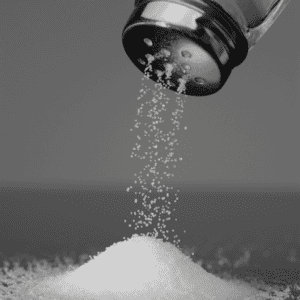
Table salt, also known as sodium chloride, is the most common type of salt used in households and restaurants. It is a mineral that is naturally found in seawater and rocks. Table salt is often fortified with iodine, a nutrient that is important for thyroid function.
While table salt is an essential ingredient in many dishes, consuming too much salt can have negative health consequences. High salt intake has been linked to high blood pressure and an increased risk of heart disease, stroke, and kidney disease. However, consuming the right amount of salt is important for maintaining proper bodily functions, such as nerve and muscle function.
To incorporate table salt into a healthy diet, it is recommended that you limit your daily intake to less than 2,300 milligrams per day. This is equivalent to about 1 teaspoon of salt. Instead of relying solely on salt for flavor, try using herbs, spices, and other seasonings to enhance the taste of your food. Additionally, be aware of the salt content in processed and packaged foods and try to choose low-sodium options when possible.
Sea Salt
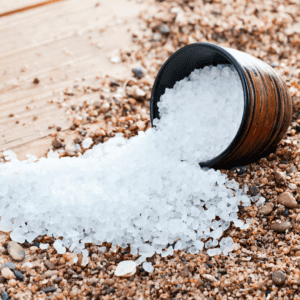
Sea salt is a type of salt that is obtained by evaporating seawater. Unlike table salt, sea salt is unrefined and contains trace minerals that are beneficial to our health. These minerals include magnesium, potassium, and calcium.
While there is limited scientific evidence to support the health benefits of sea salt, some studies suggest that it may have anti-inflammatory properties and could help regulate blood pressure. Additionally, sea salt is often less processed and contains fewer additives than table salt, making it a healthier choice for those who want to reduce their sodium intake.
If you’re looking to incorporate sea salt into your diet, it’s important to remember that it’s still salt and should be consumed in moderation. The American Heart Association recommends limiting your sodium intake to 1,500 milligrams per day, which includes all sources of sodium in your diet. You can add a sprinkle of sea salt to your meals for a touch of flavor, but be mindful of the amount you’re using. Remember, a little goes a long way!
Kosher Salt
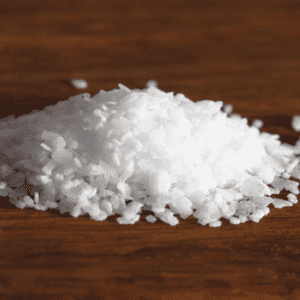
Kosher salt is a type of salt that is commonly used in Jewish cuisine. It gets its name from the process of koshering, which involves removing blood from meat using salt. Kosher salt is larger and coarser than regular table salt, and it has a different taste and texture.
While there is no significant difference in nutritional value between kosher salt and regular table salt, kosher salt can be beneficial for people who are trying to reduce their sodium intake. The larger crystals of kosher salt give it a stronger flavor than regular table salt, so you can use less of it and still get the same taste.
If you are looking to incorporate kosher salt into your diet, it is important to remember to use it in moderation. While it may have some health benefits, consuming too much salt can lead to high blood pressure and other health problems. Try using kosher salt in your cooking to add flavor to your dishes while keeping your sodium intake under control.
Himalayan Pink Salt
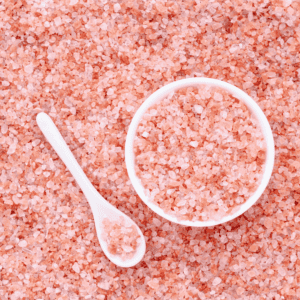
Himalayan pink salt is a type of salt that is mined from the Khewra Salt Mine in Pakistan. It is known for its distinctive pink hue and is often used as a healthier alternative to regular table salt.
Many people believe that Himalayan pink salt has several health benefits. It is said to contain more than 80 trace minerals, including calcium, magnesium, and potassium. These minerals are essential for maintaining a healthy body and can help to improve bone health, regulate blood pressure, and support a strong immune system.
If you are looking to incorporate Himalayan pink salt into your diet, it is important to do so in moderation. While it may have some health benefits, consuming too much salt, even if it is the pink variety, can still be harmful to your health. It is recommended that you limit your daily salt intake to no more than 2,300 milligrams per day, which is about a teaspoon of salt. Remember to always consult with a healthcare professional before making any significant changes to your diet.
Celtic Sea Salt

Celtic Sea Salt is a type of salt that is harvested from the coastal region of Brittany, France. It is known for its distinct flavor and texture, and for being rich in minerals such as calcium, magnesium, and potassium. Unlike regular table salt, which is often heavily processed and stripped of its natural minerals, Celtic Sea Salt is minimally processed and retains its natural mineral content.
One of the health benefits of Celtic Sea Salt is that it may help to regulate blood pressure levels. The minerals in Celtic Sea Salt work together to help balance the body’s electrolytes, which can help to lower blood pressure. Additionally, Celtic Sea Salt is lower in sodium than regular table salt, which can also contribute to improved heart health.
If you’re looking to incorporate Celtic Sea Salt into your diet, I recommend using it as a finishing salt, rather than a cooking salt. This means adding a pinch of salt to a finished dish, rather than using it as a primary seasoning during cooking. You can also use Celtic Sea Salt in place of regular table salt in recipes, but keep in mind that it may have a slightly different flavor profile. As with any type of salt, it’s important to consume Celtic Sea Salt in moderation, as excessive salt intake can have negative health consequences.
No matter which type of salt you choose to use, it’s important to keep in mind that they all contain sodium. Consuming too much sodium can lead to health problems like high blood pressure and heart disease. It’s important to use salt in moderation and to choose healthier alternatives when possible.
Tips for Salt in a Diet
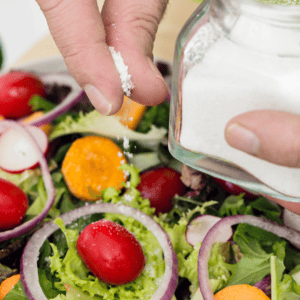
When it comes to incorporating salt into a healthy diet, it’s important to remember that moderation is key. Here are some practical tips to help you make the most of salt in your meals while still maintaining a healthy balance.
Firstly, choose the right type of salt. While table salt is the most common, it’s often heavily processed and lacks trace minerals that are important for good health. Consider using sea salt or Himalayan pink salt, which are minimally processed and contain a wider range of minerals.
Secondly, be aware of salt content in processed foods. Many packaged snacks and ready-made meals are high in sodium, so check the nutrition label before buying. Opt for whole foods like fresh vegetables, fruits, and lean proteins to reduce your overall sodium intake.
Finally, when cooking with salt, do so in moderation. Start with a small amount and taste your dish as you go, adding more salt gradually until it reaches the desired flavor. Remember, you can always add more salt, but it’s much harder to remove it once it’s been added.
Incorporating salt into a healthy diet is all about balance and awareness. By choosing the right type of salt, checking nutrition labels, and using salt in moderation, you can enjoy the benefits of this essential mineral while keeping your body healthy and happy.
Salt in the Bible Conclusion
Salt is not only a significant element in the Bible but also plays an essential role in our health. As a symbol of hospitality and covenant, purifying agent, and a metaphor for wisdom, salt has spiritual and cultural importance. On the other hand, our bodies require salt to function properly, but overconsumption can lead to health problems like hypertension.
It’s crucial to consume the right amount of salt to maintain a healthy balance. Choosing the right type of salt, understanding the salt content in processed foods, and cooking with salt in moderation are practical tips for incorporating salt into a healthy diet.
Remember that the benefits of salt consumption come with moderation, and it’s essential to consult with a healthcare provider for individual needs. By understanding the importance of salt in the Bible and our health, we can make informed decisions about our diets and lead healthy life.
So, don’t shy away from using salt, but use it mindfully and appropriately. With a little awareness and care, you can incorporate salt into your diet and reap the benefits while honoring its significance in the Bible.

